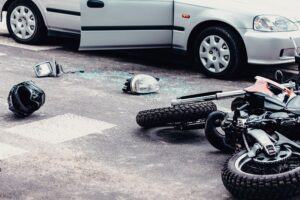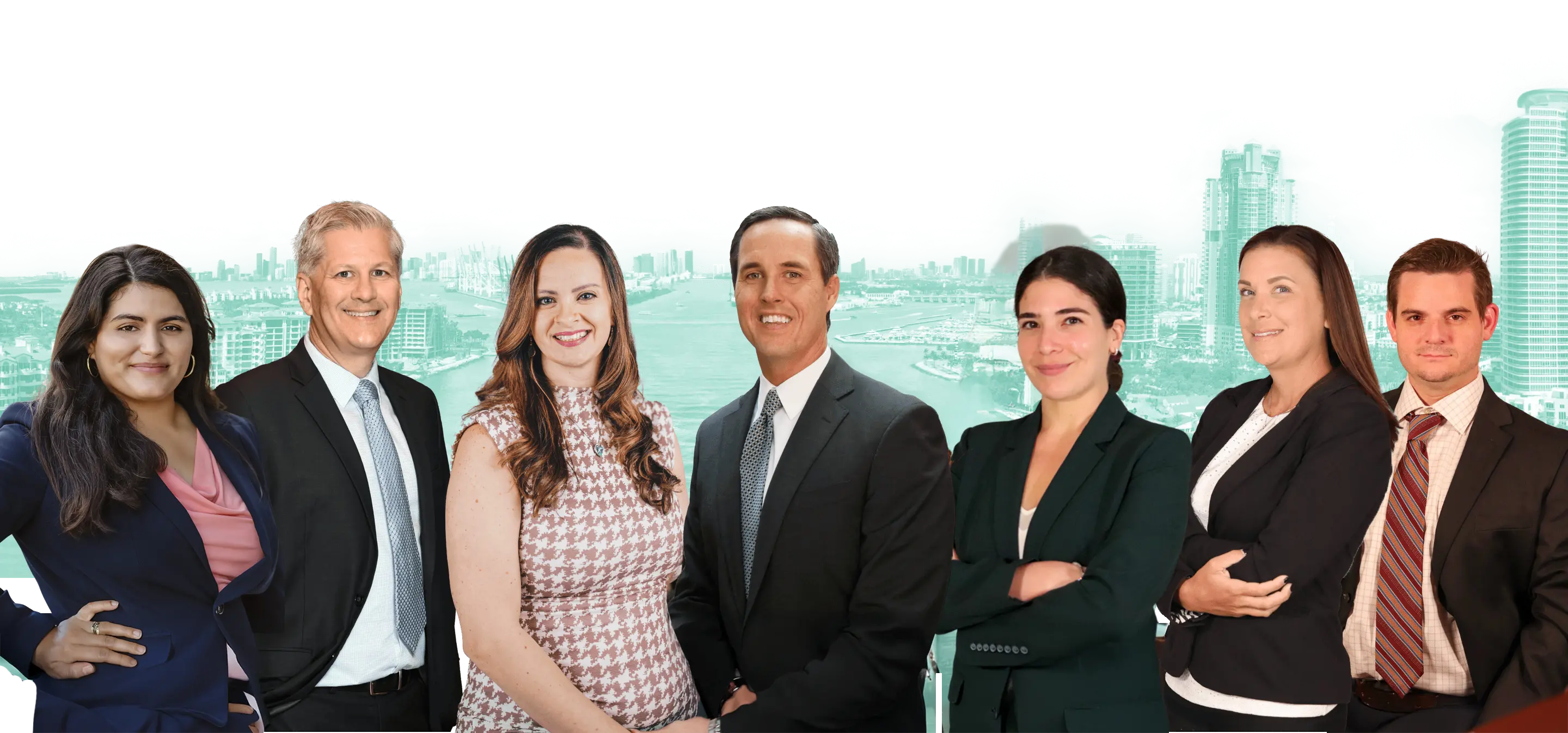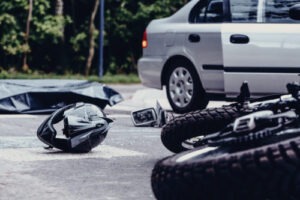
Not only are motorcycle crashes, injuries, and deaths frequent, the injuries are far too often extremely serious. Motorcyclists ride without the significant protection afforded by the tons of metal cushioning and safety features that surround motorists in other vehicles. In addition, of course, motorcycles are much smaller than most other vehicles on the road—such as cars and trucks.
As a result, motorcyclists are far more likely than occupants of other vehicles to suffer injuries or death in the event of a crash.
Finally, in the Sunshine State, not even helmets are required for drivers aged 21 or above, as long as they carry $10,000 in medical insurance; they are mandated for motorcyclists under 21. A crash can cause severe head injuries such as a traumatic brain injury (TBI) or skull fracture, due to impact or the cyclist being thrown from the vehicle.
Damage Compensation in Florida Motorcycle Accidents
Whether you are injured or a loved one is killed, you have every right to wonder who pays for your medical bills if you are hit by a car in a Florida motorcycle accident. Injuries can cause thousands of dollars’ worth of medical bills, and severely catastrophic injuries that permanently alter a victim’s life can trigger medical bills in the millions.
Medical bills are not the only form of damage compensation available to accident victims, as long as the accident was caused by someone else. Motorcycle accident victims can also seek compensation for wages lost from work due to the accident, personal property damage, and, in some cases, pain and suffering caused by the accident. Read on for more information.
Medical Bills
Florida’s system for car insurance is no-fault. The state requires that all registered car owners in Florida show proof of personal injury protection (PIP) and property damage liability (PDL) insurance coverage, with a minimum amount of $10,000. This insurance comes into play regardless of who is at fault for the accident—which is why it is termed no-fault. Injured parties turn to their own PIP to pay their own medical bills.
Motorcyclists are not required to carry PIP or PDL. Many motorcyclists, however, do. If you have PIP, you can turn to it for payment of medical bills. PIP policies will cover 80 percent of medical bills related to the accident.
But what happens if you do not have PIP?
Florida allows seriously injured people to step outside the no-fault system. It requires one of the following injuries:
- Bone fracture;
- Significant disfigurement;
- Permanent limitation of use of a body organ or member;
- A significant limitation of use of a body function or system; or
- Substantially full disability for 90 days.
If you sustain one or more of these injuries and another party is at fault for the accident, you have two forms of recourse available to choose between. First, you can approach the at-fault party’s insurance company with a claim for your medical bills. Second, you may pursue a motorcycle accident lawsuit in civil court, seeking compensation for medical bills.
Injured motorcyclists in Florida also need to know that a wide range of medical bills are potentially compensable, as long as the treatment stems from injuries and harm sustained in the accident, and no other cause.
The compensable bills include:
- Doctor’s office visits
- Emergency room transport and treatment
- Surgery
- Hospitalization
- Diagnostic tests
- Physical therapy
- Prescription medication
- X-rays and other imaging
- Retrofitting a home to accommodate injuries
- Assistive devices such as walkers and canes
Both medical bills you have already incurred and future medical bills relating to the accident are part of damage compensation efforts.
Income Lost From Work
While medical treatment forms a large part of victim harm, it is not the only harm stemming from a motorcycle accident. Victims can also lose wages from work, due to the accident itself, medical treatment, or the recuperation period.
If you have PIP, you can receive damage compensation of up to 60 percent of lost wages, to the maximum of your policy.
If the injuries are disabling such that you can’t work full time or work at all at a former occupation, you can seek a benefit known as lifetime value of earnings or lost earning capacity; in other words, an estimate of what you would have received over a lifetime of work had you not suffered injuries.
If you can step outside of no-fault, you can also seek wages lost from work or the lifetime value of earnings via the at-fault party’s insurance company or a motorcycle accident suit.
Personal Property Damage
Often, during an accident, the victim’s personal property is damaged. Your motorcycle, helmet and other safety equipment, clothes, and other items may have suffered damage or been entirely lost.
PDL covers such losses up to the policy limit. If you can step outside of no-fault, you can seek compensation for the damaged property as part of your claim or lawsuit.
Pain and Suffering
If your losses are covered under PIP and PDL, you cannot seek damages for non-economic losses such as pain and suffering related to the accident.
If, however, you can step outside of the no-fault system due to your injuries, you could seek damages for pain and suffering, either from the at-fault party’s insurer or via a lawsuit.
Pain and suffering damages can cover physical, emotional, and mental pain and suffering. These types of damages can compensate victims for factors such as chronic pain, limitations in physical capacity, loss of enjoyment of activities they can’t do, and more.



Expect More, Receive More: Legal Support That Feels Like Family
What If the Car’s Driver Was Not Insured?
Despite the state’s insurance mandate, too many drivers simply choose not to insure their cars. In fact, Florida leads the nation in uninsured drivers. More than 26 percent drive without the required insurance, according to the Insurance Information Institute.
Consult an attorney if the at-fault driver does not carry insurance or if their insurance is expired. A motorcycle accident suit can potentially compensate you for your injuries.
What to Do in the Aftermath of a Motorcycle Accident
Motorcycle accidents are highly likely to leave you in pain, disoriented, frightened, and even traumatized. It is highly important, then, to have a working knowledge of what to do. Performing the proper steps despite pain and stress can help ensure that any injuries receive prompt treatment and that you have the information to receive just damage compensation if you need it.
While you need evidence about who or what caused the crash and information about the car driver, your health and safety are the priority. Do not wait for the car driver’s insurance information if emergency personnel want to take you to the emergency room. All evidence and information can still be available after you have received treatment.
Immediately after the accident, move to a safe location if you are able. You should stay safely out of traffic and away from obstacles.
Call 911 immediately if you can. The operators will summon both an ambulance if necessary and law enforcement to come to the scene. If you do not know the exact location, give as much detailed information about where you are as possible.
Go to the emergency room if necessary. If you have not been seriously injured, stay on the scene. It is against the law to leave the scene of an accident unless you are seriously injured.
When law enforcement arrives, they will talk to all the drivers involved. They also survey the scene, look at the vehicles, and make an initial determination of how the accident happened. They may cite drivers for traffic violations, such as running a red light or failure to yield right of way. If they suspect the involvement of alcohol or other substances that can impair driving, they can perform field sobriety tests or other tests.
Tell them fully and completely what you saw and experienced.
Exchange contact information with all other drivers, such as email addresses and insurance information.
If you have a smartphone or other camera with you, take pictures of the accident scene. Your purpose is to indicate how the accident happened and the extent of the damage. Take pictures of the vehicles from all angles. Take pictures of any indicators about the accident, such as bent road signs, guardrails, or skid marks.
If you see eyewitnesses, get their contact and other information.
Law enforcement officials will indicate when you can leave. They should provide you with a copy of the accident report. If they do not, ask for one. Keep it; it is a very important piece of evidence.
See a doctor to check out any injuries as soon as possible after the accident. Never try to diagnose your own condition after a motorcycle accident. An injury that seems minor to you, such as a small head wound or a headache, could constitute signs of significant harm, such as TBI. Some significant injuries, such as cracked ribs, may not manifest with any symptoms at all at first.
Explain to the doctor that you were in a motorcycle accident. They can perform diagnostic tests and take x-rays and other imaging to let them know of any injuries.
Whether you are treated in an emergency room or see a doctor, follow all treatment recommendations. This is highly important to recover from any injuries and ensure your continued health. But, it is also important to make sure that you receive just compensation for your medical bills and other damage.
If you do not follow recommendations, such as filling and taking prescription medication or seeing a specialist, the at-fault party’s insurer is likely to find that out. They will look at your records and whether you are healing. If you do not follow medical advice, they can use it to argue that you were not injured as badly as you say. They may even argue that you bear responsibility for the complications that have arisen from your injuries.
Keep records of all medical treatments: appointments, times, diagnoses, advice, and bills. These too constitute evidence that can help your compensation case.
It is very prudent to see an attorney after an accident. An experienced motorcycle accident attorney can keep you from making mistakes that could cost you dearly later on (such as not following doctor’s orders).
Attorneys can also explain your rights, help you negotiate, and help compile evidence.
You should contact an attorney before you contact the at-fault party’s insurance company. Why? Because insurance companies have a vested interest in maintaining their profits. Paying you a just claim is not the way to profitability. They use sophisticated techniques to deny or minimize claims.
One is to offer a quick claim settlement for an amount far lower than what you deserve. An attorney can help you recognize a fair settlement.
Another is to maintain that your injuries are less severe and significant than what you claim. They may also try to paint you as the responsible party.
Insurance companies can go to great lengths to try to paint you as less deserving of compensation than you are. One popular technique is to search your social media profiles on popular platforms like Facebook and Instagram. Many people post pictures or exchanges showing them having fun or enjoying themselves.
But the insurance company can attempt to portray these posts as signs that you were not harmed as much as you claim by the motorcycle accident. Even an innocent picture showing you laughing at your daughter’s wedding or picking up your children can potentially become weapons in such an argument.
As a result, it is a good idea to refrain from posting on social media sites until your claim or suit is resolved. You do not have to go off the sites completely, just do not post or write about your life.
For more information, contact an experienced motorcycle accident attorney.






